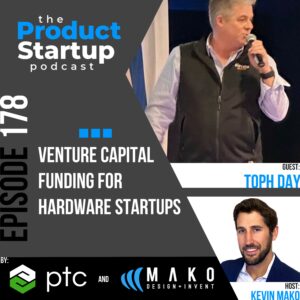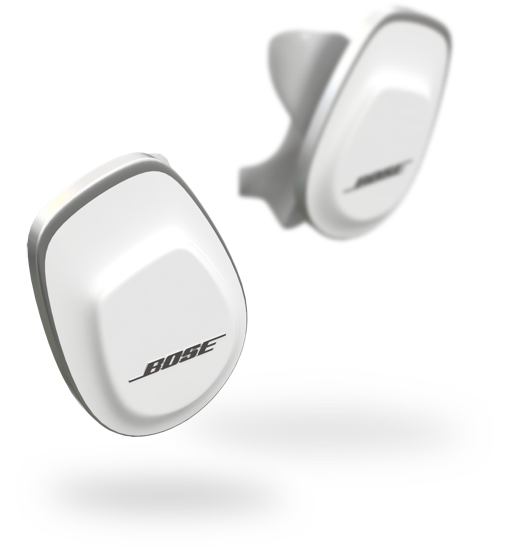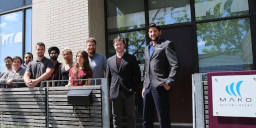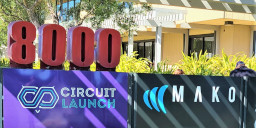With Toph Day, CEO of Elevate Ventures
Hosted by Kevin Mako, President of MAKO Design + Invent

As the CEO of Elevate Ventures, Toph Day leads a prominent Venture Capital firm with a diverse portfolio of hardware companies and over $220 million in managed investments. With a remarkable entrepreneurial background, Toph has successfully founded eight companies and orchestrated transactions exceeding $600 million throughout the past three decades. Today, Toph aims to impart invaluable insights to inventors, startups, and small manufacturers, covering topics such as the essence of venture capital funding, its suitability for different ventures, and expert advice on planning and presenting a hardware startup to VC firms.
Today you will hear us talk about:
- Venture capital typically caters to more advanced stages and requires a higher level of sophistication, often surpassing initial rounds.
- Ensure that your pitch and business plan are concise and well-structured.
- It is crucial to thoroughly comprehend the investment preferences of your venture capital firm.
- Verify that the venture capital firm specializes in funding hardware technology.
- Foster relationships with your investors well in advance, building a connection over the course of about a year.
- Maintain a focused pitch without exaggeration or embellishment.
- Familiarize yourself with the framework of venture capital funding.
- Establish a clear and well-defined legal structure when launching your company.
- Utilize convertible notes as an option for your investors.
- When seeking capital, explore all available programs and grants.
- Treat grants separately from revenue; do not include them in your financial projections.
- Hardware startups can achieve success through gradual growth.
- Alternatively, hardware companies have the potential for rapid expansion.
- Surround yourself with strategic partners and prioritize their involvement over excessive hiring.
- Prototypes often require multiple iterations before reaching the desired outcome.
- For hard tech ventures, embracing a focused and streamlined product for the initial version is key.
EPISODE HIGHLIGHTS
- 1:15 – Venture capital funding for hardware startups
- 2:50 – What is Venture Capital, and how that fits within other types of funding rounds for physical product hardware companies and startups?
- 3:15 – Venture capital layers in more investment rigor and discipline than angel investors or friends and family investors.
- 3:20 – Make sure your business model is extremely professional and tight, and don’t exaggerate.
- 3:30 – Initial design, engineering, and prototyping is usually self-funded or through friends and family.
- 4:00 – Angel investing is usually done after hardware startups have finished prototyping and have a physical product and potentially manufacturing
- 4:20 – Venture capital requires, at a minimum, some level of manufactured product and some provable sales.
- 4:40 – Understand if your venture capital firm even invests in hardware and hard tech, and understand what phase they invest in.
- 5:00 – Don’t have conversations too early when you aren’t ready to pitch to a particular level of financing. If you think they are interested, they are only treating you well as you do not meet their mandate.
- 5:30 – Keep a clean legal structure when you start your company if you bring on investors
- 5:45 – SAFE agreements are not ideal for most hardware startups
- 6:15 – If you create too much complexity in the deal structure, VCs won’t even look at it to invest.
- 6:45 – Use a convertible note if you plan to have a few rounds of financing over many years.
- 7:05 – The further that a hardware founder can push investing themselves, the far better off you will be for raising more money for less equity given away down the road.
- 8:20 – You will likely use funding rounds at some point in the scale of your business.
- 9:00 – Continue to progress the technology, it will continue to improve the attractiveness of your hardware startup for investment.
- 9:15 – Don’t be afraid to start selling to the market to get your product to scale early.
- 10:00 – Partnerships are critical to developing a new hardware product.
- 10:30 – Leverage partnerships, like Mako Design, to get to the market faster and at much better quality.
- 11:15 – The most successful hardware products are surrounded by partner companies that are the best in their space.
- 11:30 – Make sure you have a design firm early in the process so that you can design, prototype, test, and continue to iterate to improve the product over time.
- 11:45 – If you can build a hardware product from a strong foundation in a world-class way, early on, you have a strong foundation for going into functionality testing, then reliability testing, then manufacturing and scaling manufacturing.
- 12:40 – Prototyping methods are so powerful now that you can design, prototype, test, and iterate much earlier in the development process.
- 13:05 – Narrow and deep – Do a really good job at a very specific hardware niche, then grow your product from there. MVP product. Don’t try and be all things to all people when you are building a hardware startup.
- 13:50 – Feature creep is deadly to a hardware founder.
- 14:00 – Hyper-focus on the core idea, and focus on the quality of those fewer core features so that you can do a great job on those features. This de-risks the whole development process, especially when you listen to customer feedback.
- 15:30 – Corporate design theory vs hardware startup theory.
- 16:45 – Launching the new Rally Conference for innovation.
EPISODE LINKS
Toph Day Links:
LinkedIn | Elevate Ventures | Rally Conference
The Product Startup Podcast Links:
https://www.ProductStartup.com/
Instagram | LinkedIn | Facebook Page | Facebook Group | Pinterest | Twitter | YouTube
PTC Links:
https://www.ptc.com/
OnShape | Creo
Mako Design Links:
https://www.makodesign.com/
YouTube | Instagram | LinkedIn | Facebook | Pinterest | Twitter
Kevin Mako Links:
Instagram | LinkedIn | Quora | Facebook | Twitter
Partner: PTC’s best-in-class software solutions Onshape: The only cloud-native product development platform that delivers full-featured computer-aided design (CAD), integrated product data management (PDM) and enterprise analytics in a single system, and Creo: 3D CAD solution that provides designers with the most innovative tools to build better products faster, such as generative design, additive manufacturing, real-time simulation, IIoT, and augmented reality.











